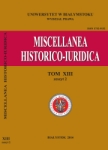Pojęcie konkubinatu w świetle polskiej doktryny i orzecznictwa
Concubinage – the meaning of the term in the light of Polish juridical doctrine and court decisions
Author(s): Bartłomiej OszkinisSubject(s): Law, Constitution, Jurisprudence, Civil Law, Family and social welfare
Published by: Wydawnictwo Uniwersytetu w Białymstoku
Keywords: concubinage; partnership; legal definition; family law; Polish law;
Summary/Abstract: Accepted by some groups of people and condemned by others, informal relationships have been recognized but not defined by the Polish legislator. In the absence of legal definition it is a task of legal scholars and judges to establish what kind of relationships can be classified as falling under the heading of the equivocal expressions used by the legislator in legal acts. Traditionally, concubinage is deemed as a relationship of that kind. However, it is highly controversial how this type of informal union should be defined. In the first part of this paper the author presents opinions of the legal scholars and judges on the constitutive features of concubinage and proposed definitions of the term. In the second part he analyzes presented data and proposes a typological definition of concubinage which on the grounds of Polish legal tradition can be described as a heterosexual, stable, (not necessarily) notorious relationship of two (or more) people who live together (or not). The cohabitants cannot be legally married and have to form a life communion (characterized by the existence of emotional, physical and economic sensu largo bonds). The union has to be seen by them as an autotelic value and cannot (even potentially) be against the law.
Journal: Miscellanea Historico-Iuridica
- Issue Year: 13/2014
- Issue No: 2(2)
- Page Range: 193-215
- Page Count: 23
- Language: Polish

